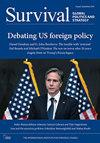如何看待国家支持恐怖主义
IF 1.9
3区 社会学
Q2 INTERNATIONAL RELATIONS
引用次数: 0
摘要
国家支持恐怖组织通常是为了削弱他们的对手,压制他们的对手,给自己提供他们本来没有的选择。通过提供武器、训练、庇护所和其他支持,国家可以使恐怖组织更加致命,提高他们的技能和生存能力。与此同时,国家经常对其代理人施加限制,给恐怖分子制造了许多困难。伊朗和美国及其盟友的其他敌人长期以来一直支持恐怖分子,在与俄罗斯的持续对抗中,国家的赞助很可能会发挥作用。鉴于俄罗斯在乌克兰的耻辱,以及对敌人的报复,俄罗斯可能会加倍加强与极端分子的现有联系。然而,对抗支持恐怖主义的国家是困难的。对于民主国家来说,贴上“国家赞助者”的标签可以成为一种强有力的修辞、法律和政策工具。与此同时,它经常被滥用,成为一种空洞的政治姿态,甚至适得其反。“国家赞助者”的标签是高度政治化的,像巴基斯坦这样的长期赞助者避免使用这个标签。澄清什么是国家赞助,增加指定的灵活性,让政策制定者在何时实施制裁方面有更多的回旋余地,以及了解如何更好地打击国家赞助是至关重要的。本文章由计算机程序翻译,如有差异,请以英文原文为准。
How to Think About State Sponsorship of Terrorism
Abstract States usually support terrorist groups to weaken their rivals, silence their opponents and give themselves options they otherwise lack. By providing weapons, training, a sanctuary and other support, states can make terrorist groups more deadly, increasing their skill and survivability. At the same time, states often impose constraints on their proxies, creating many difficulties for the terrorists. Iran and other enemies of the United States and its allies have long supported terrorists, and state sponsorship is likely to play a role in any continued confrontation with Russia, which may double down on existing ties to extremists given its humiliation in Ukraine and desire for revenge on its enemies. Confronting state sponsors of terrorism is difficult, however. For democracies, applying a ‘state sponsor’ label can be a powerful rhetorical, legal and policy tool. At the same time, it can often be misused, become an empty political gesture or even backfire. The ‘state sponsor’ label is highly politicised, and long-standing sponsors like Pakistan have avoided it. Clarifying what state sponsorship is, increasing the flexibility of the designation, giving policymakers more leeway on when to impose sanctions, and otherwise knowing how to better combat a state sponsor is vital.
求助全文
通过发布文献求助,成功后即可免费获取论文全文。
去求助
来源期刊

Survival
Multiple-
CiteScore
2.10
自引率
16.70%
发文量
88
期刊介绍:
Survival, the Institute"s bi-monthly journal, is a leading forum for analysis and debate of international and strategic affairs. With a diverse range of authors, thoughtful reviews and review essays, Survival is scholarly in depth while vivid, well-written and policy-relevant in approach. Shaped by its editors to be both timely and forward-thinking, the journal encourages writers to challenge conventional wisdom and bring fresh, often controversial, perspectives to bear on the strategic issues of the moment. Survival is essential reading for practitioners, analysts, teachers and followers of international affairs. Each issue also contains Book Reviews of the most important recent publications on international politics and security.
 求助内容:
求助内容: 应助结果提醒方式:
应助结果提醒方式:


